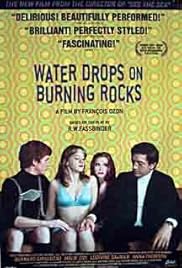WATER DROPS ON BURNING ROCKS(Gouttes d’eau sur pierres brûlantes)
(director/writer: Francois Ozon; screenwriter: from a play “Tropfen Auf Heisse Steine” by Rainer Werner Fassbinder; cinematographer: Jeanne Lapoirie; editor: Laurence Bawedin; cast: Bernard Giraudeau (Leopold Bluhm), Malik Zidi (Franz), Ludivine Sagnier (Anna Levine), Anna Thomson (Vera); Runtime: 82; Zeitgeist Films; 1999-France)
“It’s a film that should satisfy followers of both Fassbinder and Ozon.”
Reviewed by Dennis Schwartz
The 32-year-old French enfant terrible François Ozon revives a play that Rainer Werner Fassbinder wrote at 19 that was never produced in his lifetime. Water Drops on Burning Rocks is an unsentimental love story farce set in the Berlin of the early 1970s, but with French dialogue and the poet Rilke sometimes quoted by the characters. It’s a movie fascinated by the power of sex and by the overall human condition rather than with any particular human being. It’s armed with a stinging comical dialogue and it’s a gabby melodrama that presents a dreamland scenario in the surreal setting of a luxuriously decorated apartment. It is obviously in parts autobiographical of Fassbinder (he committed suicide in 1982, at the age of 36, after directing some 40-odd films and as a teen was reputedly a prostitute with a male clientele). Malik Zidi plays the 20-year-old Franz — a name used by the German director in his films as an alter ego. The film is divided into four acts.
The plot anticipates Fassbinder’s usual themes in later films of the meaning of death, the angst of a mother complex and sex as a power trip. Leopold Bluhm (Bernard Giraudeau) is the confident, cunning, urbane and domineering 50-year-old travelling businessman, who picks up and seduces the effeminate and carefree good-looking redhead Franz. He is engaged to a sweet and naive shopgirl he has known for the last three years, Anna (Ludivine Sagnier). The seduction takes place over a board game called ludo, as Leopold likes games and the young man from a broken home gets frustrated when he loses. The seduction in the apartment of shag rugs and middle-class good taste works and Franz moves in as lover/housekeeper, but after six months Leopold grows weary of him as he starts to rag him without cause. At this time the jilted but devoted Anna shows up while the salesman is on the road, and the two use his mirrored bedroom for sex and reconciliation. They decide to run away together to get married and have two boys named Franz and Leopold, but Leopold unexpectedly returns and Franz is overwhelmed when trying to tell him of his plans to escape from his decorative prison residence. The wily businessman gets Anna sexually aroused as she entertains him in her underwear, and this gets Franz thinking that the older man uses sex as a weapon and wants to make whores out of those he no longer yearns for. This is followed by the unexpected visit of Vera (Anna Thomson-American actress), the ex-wife of Leopold from ten years ago. Vera was a young boy when Leopold met him and they became lovers, but he tired of her and talked her into getting a sex change to a girl. The transsexual Vera has recently been married to Helmut, but returns when separated to seek solace from Leopold. He offers her a roll in the sack with him and Anna, but he turns his complete attention on the younger girl with the big breasts. This is the final insult for Vera, as she prepares to leave him for good.
Warning: spoiler in the next paragraph.
When Vera leaves the boudoir and encounters the sad Franz sitting on the floor wearing her fur coat, she tries to start up a relationship with him. But he tells her it’s too late, he just took poison. Both Franz and Vera have sacrificed everything for the love of Leopold and both are left high and dry. There is no communication or real feelings other than overwrought emotional responses among any of the characters. To further highlight this, Franz calls his dear mom (someone he says is special to him) about what he has just done and all she can manage to say is bon voyage.
There’s one bizarre scene worth savoring where all four characters are grooving in line to a German pop tune from the 1970s. It’s a film that should satisfy followers of both Fassbinder and Ozon, but will probably be distant for a general audience. What’s unique is the marriage of the Teutonic soberness and poetic depth of Fassbinder with the Gallic humor and warmth of Ozon, that seems like a shotgun marriage made on some unnamed planet. This is strictly a theater film, as there was not one exterior shot. It should also be noted that in Fassbinder’s version he made Leopold a Jewish survivor of the concentration camps, but Ozon decided not to explore that avenue and let his character remain without that additional baggage and therefore kept the film lighter (a good idea!).

REVIEWED ON 6/13/2002 GRADE: B + https://dennisschwartzreviews.com/